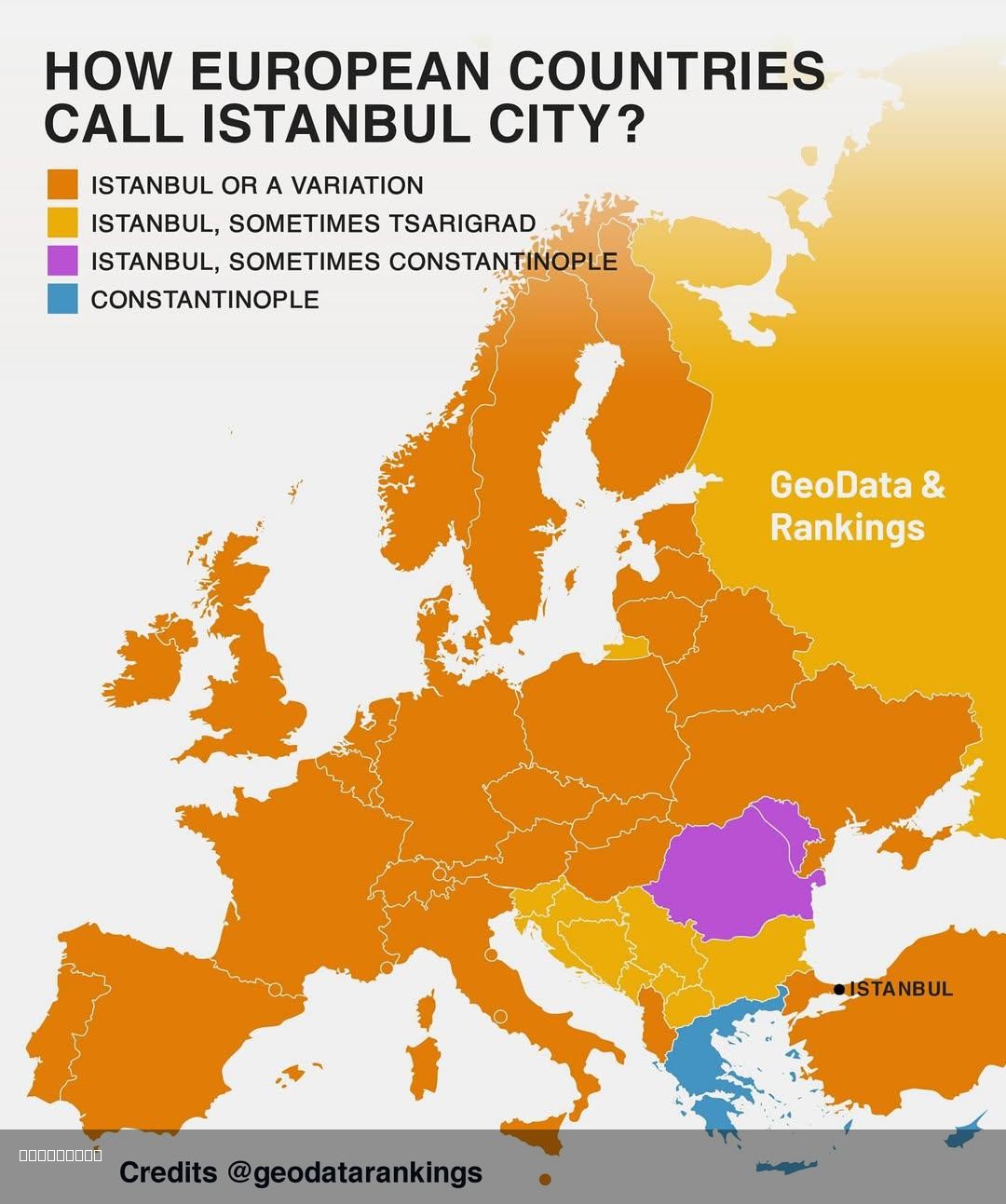Map of How European Countries Call Istanbul


David Chen
Data Visualization Specialist
David Chen is an expert in transforming complex geographic datasets into compelling visual narratives. He combines his background in computer science ...
Geographic Analysis
What This Map Shows
This map illustrates the various names that different European countries use to refer to the city of Istanbul, Turkey. While many countries share the same name for the city, others have unique variations that reflect their languages, histories, and cultural connections. This visual representation serves as a fascinating glimpse into the linguistic diversity across Europe and highlights how historical ties can influence the nomenclature we use today.
Deep Dive into City Names
Istanbul is not just a city; it is a cultural crossroads that has witnessed the ebbs and flows of empires, trade, and migration. The name itself has a rich history, evolving from Byzantium to Constantinople, before finally becoming Istanbul. Each of these names carries with it a story rooted in the city’s long and complex past.
Interestingly, the name ‘Istanbul’ is derived from a Greek phrase, ‘eis tin polin,’ meaning ‘to the city.’ This term reflects the city’s significance as a bustling urban center. However, when we look at how various European countries refer to Istanbul, we see a spectrum of influences.
For instance, in Greece, the city is still commonly referred to as ‘Konstantinopoule,’ a nod to its Byzantine heritage. This name evokes images of ancient architecture, philosophical debates, and the heart of the Eastern Orthodox Church. Conversely, in Italian, the city is called ‘Costantinopoli,’ showcasing the Italian connection to the city's historical significance during the Renaissance.
In contrast, countries like Bulgaria and Serbia have their own unique variations: ‘Istanbul’ remains the same in both nations, yet the way it is pronounced is often influenced by local dialects. In Hungary, it is known as ‘Isztambul,’ adapting the name to fit Hungarian phonetics.
What’s fascinating is how these names reveal the historical interactions of these countries with the city. The Ottoman Empire, which ruled over much of southeastern Europe for centuries, has left a lasting imprint on how countries perceive and name Istanbul. Moreover, the city’s role as a hub for trade, culture, and religion continues to resonate in its names across Europe today.
Regional Analysis
When analyzing the names of Istanbul by region, we can see distinct linguistic patterns emerge. For instance, in Southern Europe, countries like Italy and Spain may have names that resonate with their historical ties to the Byzantine and Ottoman Empires. Their names often reflect a blend of admiration and historical legacy, portraying Istanbul as a gateway between continents.
In contrast, Central and Eastern European countries often retain the name ‘Istanbul,’ but with localized pronunciations. This consistency across several nations indicates a shared recognition of the city’s significance, even if the historical context differs. For instance, in Poland, the name ‘Stambuł’ is used, a phonetic adaptation that still honors the city’s identity.
Moreover, the Scandinavian countries present an interesting case. In Swedish, Istanbul is referred to as ‘Istanbul,’ which mirrors the international standard. However, historical texts may refer to it as ‘Konstantinopel,’ indicating that the old names still hold weight in literary and academic discussions.
Significance and Impact
Understanding how different European countries refer to Istanbul is more than just a linguistic curiosity; it reflects the city’s historical importance and its role as a cultural melting pot. The names we use for places are imbued with stories of conquest, migration, and exchange. They remind us of the interconnectedness of our histories.
In a world that is increasingly globalized, recognizing these local adaptations can foster greater appreciation for cultural diversity and heritage. What's more, as tourism continues to grow, the way people refer to Istanbul can influence perceptions. Visitors may find themselves intrigued by the city’s rich tapestry of names and the stories behind them, encouraging a deeper exploration of its history and culture.
As we move further into the 21st century, the relevance of Istanbul as a bridge between East and West remains strong. Understanding the names used by different countries can help us appreciate not only the significance of Istanbul but also the shared histories that bind us together across borders. Have you noticed how a city’s name can evoke memories of its past and shape our understanding of its present? It’s this interplay of language and history that makes geography such a compelling field of study.
Visualization Details
- Published
- August 3, 2025
- Views
- 176
Comments
Loading comments...